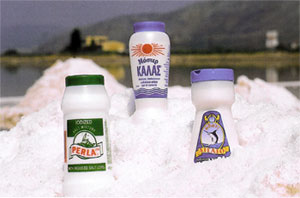|
|
|
Sea Salt
 |
In
ancient times, salt was already
indispensable for seasoning.
At first it was evidently less often
used just to flavor food, but more
as a way of preserving fish and meat
- there are countless sources
containing references praising
salted tuna fish. Salt was
also important in the production of
a strong, spicy fish sauce (igaros,
Roman igarum), which formed
part of many dishes in which you
would not expect to find it today.
Various kinds of fish and fish
waster were mixed with salt and
fermented in the sun in large
earthenware pots for three or four
months, while being constantly
stirred. After being strained,
flavored with herbs, and |
|
Good
sea salt should not be bleached and
should feel slightly moist.
The biggest salt
suppliers get their salt from
central Greece.
|
|
transferred to
more manageable clay jars,
igaros would keep for a
relatively long time. You have
to imagine a product something like
the Asian fish sauce.
It is
unnecessary to stress the importance of salt
in modern Greek cooking But salt production
is inextricably linked to one of the
unforgettable names in Greek history, which
will never lose its importance for Greek
national feeling. The modern day salt
center for the country lies very close to
the town of Missolonghi, which is situated
on the Gulf of Patras in the southwest of
central Greece and was a center of Greek
resistance at the beginning of the 19th
century. The major Greek salt
companies are located here. As in the
other salt producing regions of the world,
salt is produced by channeling seawater into
big, shallow evaporating pans, in which the
first pollutants can settle to the bottom,
and the salt content of the water can be
increased by repeatedly letting new sweater.
These pans feed the salt gardens, where the
water finally evaporates in the sun until
the crystallized salt remains. About
one third of the world demand for salt is
produced from the sea in Greece and France.
Unlike tock salt, sea salt contains very
small amounts of additional minerals such as
bromine or iodine. The latter
regulates the metabolism and the functioning
of the thyroid gland, so sea salt can
prevent iodine deficiency and the symptoms
connected with it. high quality sea
salt is sold unrefined, unbleached and
without anti-caking agents. It is pale
gray and lumpy.
The salt pans of Missolonghi are also home
to a huge variety of birds. Avocets,
great white herons, and stilts are as much
at home here as calandra, crested, and short
toed larks. There are plenty of fish
here for them.
|
excerpts from:
"Culinaria Greece"
|
Copyright ©2001 - 2008
GreekCuisine.com. All rights reserved.
GreekCuisine.com is part of the
GoGreece.com network
2665 30th Street Suite 214, Santa Monica, CA 90405 USA
|